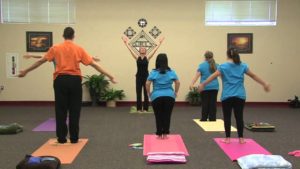Improve Psychomotor Perform of Intellectually Disabled Children with Yoga
By John M. de Castro, Ph.D.
“Special needs experts agree that yoga activities make a positive impact on individuals with special needs. These activities improve mobility, strength, and digestion for individuals with disabilities.” – Cara Batema
Intellectual disabilities involve below average intelligence and relatively slow learning. They are quite common, affecting an estimated 10% of individuals worldwide. These disabilities present problems for the children in learning mathematics, reading and writing. These difficulties, in turn, affect performance in other academic disciplines. The presence of intellectual disabilities can have serious consequences for the psychological well-being of the children, including their self-esteem and social skills. In addition, anxiety, depression, and conduct disorders often accompany learning disabilities. Not as well known is that children with intellectual disabilities also have motor problems.
Mindfulness training has been shown to improve attention, memory, and learning and increase success in school. Exercise has been shown to improve psychomotor performance in children with intellectual disabilities. Yoga is both a mindfulness practice and an exercise that also tends to improve motor ability. So, it would make sense to explore the application of yoga training for the treatment of children with intellectual disabilities.
In today’s Research News article “Effect of yoga practices on psycho-motor abilities among intellectually disabled children.” (See summary below or view the full text of the study at: https://www.ncbi.nlm.nih.gov/pmc/articles/PMC6165980/ ), Pise and colleagues recruited children aged 10 to 15 years from a school for the intellectually disabled. They were randomly assigned to a no-treatment control group or to receive yoga training for 1 hour per day, 5 days per week, for 12 weeks. The practice consisted of relaxation, postures, breathing exercises, and meditation. They were measured before and after training for balance, eye-hand coordination, agility, and reaction time.
They found that in comparison to baseline after the yoga training there were significant increases balance, eye-hand coordination, and agility, and decreases in reaction time. In comparison to the no treatment control group, the yoga group after training had significantly greater balance and faster reaction times. Hence, yoga practice appears to improve motor performance in children with intellectual disabilities.
These results were obtained with a no-treatment control condition. They need to be repeated with an active control condition such as a different exercise to determine if it was yoga practice itself or the exercise provided by yoga practice that was responsible for the improvements. But, nonetheless, the results suggest that yoga practice may be beneficial for children with intellectual disabilities. Improved motor ability might affect their performance in activities and sports and thereby improve their self-esteem.
So, improve psychomotor perform of intellectually disabled children with yoga.
“Yoga for special needs classes provide a sense of belonging and community. These adaptive yoga classes focus on building strength, developing regulation skills through breathing, improving mobility and maintaining/improving overall health and emotional well-being.” – Project Yoga
CMCS – Center for Mindfulness and Contemplative Studies
This and other Contemplative Studies posts are also available on Google+ https://plus.google.com/106784388191201299496/posts and on Twitter @MindfulResearch
Study Summary
Pise, V., Pradhan, B., & Gharote, M. (2018). Effect of yoga practices on psycho-motor abilities among intellectually disabled children. Journal of exercise rehabilitation, 14(4), 581-585. doi:10.12965/jer.1836290.145
Abstract
The children with intellectual disabilities show disorders at motor development and coordination. Hence, the objective of this study was to see the effect of yoga practices on psycho-motor abilities of intellectually disabled children. Seventy intellectually disabled children were divided into experimental group and control group. Both experimental and control group were assessed on the first day and after 12 weeks of the yoga intervention for static balance, eye hand coordination, agility and reaction time. The subjects of experimental group then underwent a training of yoga practices, for 1 hr for a total period of 12 weeks. The result of within group comparison revealed significant improvement in static balance, eye hand coordination, agility, and reaction time (P< 0.001) in subjects of yoga group however no change was observed in control group. The present study demonstrated that 12 weeks of yoga is effective in improving psycho-motor abilities of intellectually disabled children.
https://www.ncbi.nlm.nih.gov/pmc/articles/PMC6165980/
